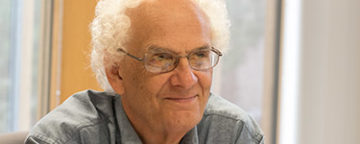At a time when the scientific consensus on critical issues such as vaccinations and climate change is being called into question, a comprehensive new handbook will examine the current state of the science of science communication.


Michael Rozansky has worked as an editor, writer and reporter for 30 years. Before joining the Annenberg Public Policy Center as director of communications, he spent more than 20 years at the Philadelphia Inquirer, most recently supervising its arts and entertainment coverage. He has reported on the arts, media, business, politics, national and regulatory issues. Rozansky also developed and taught a class at Temple University on the history and practice of celebrity journalism. He received a bachelor’s degree in English and American literature from Brown University and a master’s degree in journalism from Columbia University’s Graduate School of Journalism.

At a time when the scientific consensus on critical issues such as vaccinations and climate change is being called into question, a comprehensive new handbook will examine the current state of the science of science communication.

The public's view of scientific research was the focus of an American Academy of Arts & Sciences round table discussion hosted by the Annenberg Public Policy Center in October.

CBS News congressional correspondent Nancy Cordes will present the 2015 Annenberg Lecture, "Chasing the 'Scooby' Van and Tracking Trump to the Border: Covering the Wild Ride That is the 2016 Presidential Campaign."

One American in three says that the Bill of Rights guarantees the right to own your own home, while 1 in 10 thinks that it guarantees the right to own a pet, according to an APPC national survey released for Constitution Day.

Thousands of immigrants from across the globe will be sworn in as American citizens, while students nationwide will take part in the “Preamble Challenge” to celebrate Constitution Day (Sept. 17).

CNN's "State of the Union" and FactCheck.org, the nonpartisan fact-checking site, have announced a new partnership to create a weekly online video series looking at claims made in the 2016 presidential campaign. "State of the Union" anchor Jake Tapper will host the series.

In time for Constitution Day, Annenberg Classroom has released three videos dealing with constitutional protections and the rule of law, including habeas corpus in the Guantanamo Bay detention cases. Also back this fall is a popular online course about the Constitution from scholar Kermit Roosevelt.

Getting children to cut back on sugar-sweetened beverages like soda and energy drinks has been the goal of anti-obesity public service advertisements. A new study evaluates the effectiveness of persuasive techniques -- humor, fear and nurturance -- used in those PSAs.

In two addresses to groups with the Council of State Governments Eastern Regional Conference, Kathleen Hall Jamieson spoke about the attack on fact in politics, and challenges facing the scientific community and the implications for state legislative policy.

Rod Hart, former dean of the Moody College of Communication at the University of Texas at Austin, has joined APPC as a visiting scholar for the fall term. He is working on a book about civic hope, as expressed by ordinary citizens in a dozen U.S. cities over nearly 70 years.